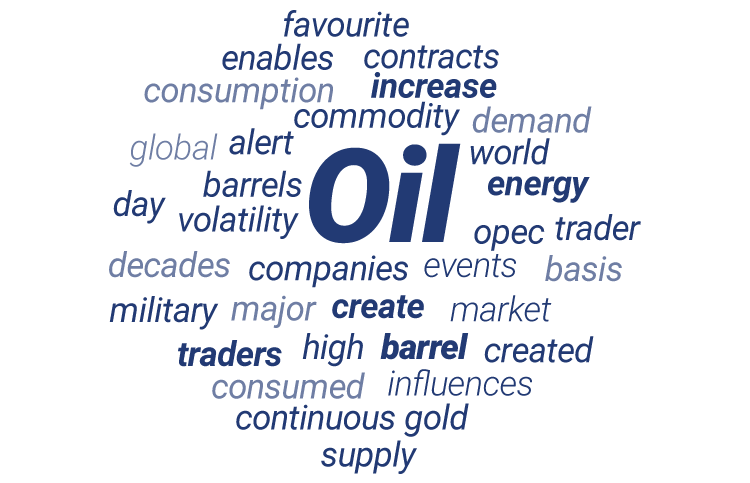What Influences the Price of Oil?
From extraction to consumption, Oil is the basis for many common products, offering traders ample opportunities to speculate on the commodity and the companies which rely on it.
Crude Oil (CL), which is priced per barrel, can be used in a variety of ways. It powers our homes as heating oil, enables transportation as Gasoline, and even is the base of the plastics which house key components in our favourite gadgets. So it’s no surprise that traders recognize both the short-term and long term value of trading on this ‘liquid-gold’ as our world becomes ever more dependent on the products it enables.

Influences on Oil’s price
There are various influences on the price of Oil which at times have brought times of great volatility. An example of this is in 2008 when Oil hit a high of $166 per barrel and another is how it hit an all time low in 2020 when it traded in the negatives.
Supply & Demand
Unlike Gold (XAU) or other precious metals, Oil is a consumable product. It’s usefulness is expelled with each use, meaning that once it is consumed, more Oil must be used to replace it. Its uses include plastics that range from thin films to military-grade parts, as well as a combustible fuel for locomotives, cars, buses, airplanes, and more.
Its seemingly endless uses in our modern world have created very high demand around the globe for this finite commodity.
Energy companies are racing to provide a continuous supply of ‘liquid-gold’ by extracting 95.2 million barrels of Oil per day around the globe in 2019. These include Crude Oil, Shale Oil, Oil Sands, and Natural Gas Oils. Since the widespread implementation of fracking in 2006, the US has become a rising energy producer, reaching 12.2 million barrels of oil per day in 2019.
Although decades-long trends show an increase in the consumption of Oil, there are various factors that may reduce demand, having major consequences for traders, such as the September 11 terror attacks in 2001 and the Coronavirus pandemic in 2020. These major events led to a significant decline in air travel, grounding flights and leaving fuel unused. This created an unexpectedly high volume of supply, sowing uncertainty into the oil markets.
Geopolitical Events
While the cost of producing and shipping oil may remain relatively stable, geopolitical events have the potential to create volatility in the Oil market. As manufacturers and traders rush to lock in rates, prices may fluctuate, rising and falling with global events.
An example of this can be a military conflict in the Middle East, where a majority of the world’s oil is extracted, or a shift in political alliances that threaten to reduce the flow of this vital commodity.
OPEC
The Organization of Petroleum Exporting Countries (OPEC) is made up of Algeria, Angola, Congo, Equatorial Guinea, Gabon, Iran, Iraq, Kuwait, Libya, Nigeria, Saudi Arabia, United Arab Emirates, & Venezuela. Founded in 1960, OPEC reports oil production per member country and collectively manages the amount of oil being produced. This ensures that their supply does not outpace demand.
Not included in this group are Russia and the United States who have become major energy producers over the last few decades and compete with OPEC for market share.

Trading sentiment
Trader sentiment can shift the price of Oil by influencing the availability of traded futures.
If there is a major increase of traders purchasing Oil Futures contracts, it may alert other traders of a sudden price movement, triggering a further increase in trader volume and raising the commodity’s price. On the other hand, if there is a lack of buyers in the market, or one of the above influences cause the market to believe that their contracts may become devalued, it may lower the value of an Oil contract.
Oil as a Volatile Commodity
Oil, as discussed above, is vulnerable to market fluctuations and trader sentiments. This volatility keeps it a continuous favourite amongst traders but also brings with it its own risks.
A military flare-up, new OPEC output guidelines, or various other global events can send the price soaring or plummeting unexpectedly. This continuous movement can be profitable but comes with risks, meaning that traders should stay alert to market movements when opening buy or sell positions on this exciting commodity.
